
 |
|
|
|
The Mickey Mouse Club Show completed Walt Disney's conquest of the television medium, a cheery half-hour that shoved awareness of Mickey and the Disney empire into American homes every weekday afternoon. The show consisted of animated opening and closing sequences (with the famous song), lots of singing and dancing by Disney's hand-picked Mouseketeer child actors, and a serialized live-action story like The Hardy Boys or Spin and Marty. For the club's third season Walt offered Annette, a twenty-chapter serial that first ran in February of 1958. Almost instantly the most popular Mouseketeer, Annette Funicello had some dancing talent and a voice that she would forever describe as nothing special. But she projected qualities that America found irresistible -- honesty, simplicity and sincerity. Impressed by the volume of Annette's fan mail, Disney made Annette a focus of his TV promotion efforts. 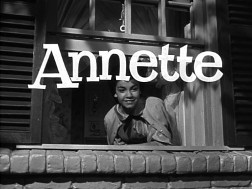
The show Annette is core Disney nostalgia. Clearly filmed on a restricted budget, the serial expands what could easily be a forty-minute story into several hours. The first episode is an odd preview of highlights of the show to come. Episode two plays almost in real time, covering barely more than the arrival of the country orphan Annette McCloud (Annette) at the doorstep of her estranged uncle Archie (Richard Deacon) and aunt Lila (Sylvia Field). Chapter 3 introduces a new character and takes us through breakfast, and so on. For economy's sake, actors park themselves in one spot for entire scenes, adding to the weird feeling of stasis. Most episodes have musical numbers, as the popular kids always seem to be rehearsing some kind of an act. A dime put in the jukebox cues an instrumental for Jet Maypen (a farm girl?) to dance to. The shows play in a sort of 50s dream world more rigid than anything in the fantasy satire Pleasantville. Clearly meant as a wholesome alternative to the threat of Rock 'n' Roll and teenage rebellion, the kids live in a fantasy of upper-middle-class advantages, in large houses with servants. All the kids speak politely, in earnest full sentences. They get together to drink malted milk and entertain each other by singing and dancing. Unlike reality, high school society is not stratified into ranks of the cool and the uncool. Everybody behaves as equals, even though the short, funny kids are the ones given jobs like changing the record player and putting up class announcements. 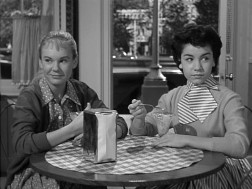
The story could easily be Walt's fantasy of his own high school days. The only culture clash is between city kids who drive collector hot rods and shiny new Ford T-Bird convertibles, and country bumpkins like Annette McCloud and Jet Maypen (Judy Nugent). Snooty teen queen Laura Rogan (Jymme Shore, later Roberta Shore) resents Annette from the start, mostly because Annette's natural sweetness attracts the most popular boys (Tim Considine and David Stollery of Spin and Marty). Annette is unassuming and wears a plain wardrobe, but Laura dresses and acts like a spoiled teenage model. The show's single conflict surfaces when Laura unjustly accuses "the new girl" Annette of stealing a piece of jewelry. The series probably charmed legions of teenage girls who identified with Annette's situation. Arriving in an outmoded country dress, Annette McCloud is given a new wardrobe by her new relatives and doted on by their loveable maid (Mary Wickes). Annette may be the underdog New Kid in School, but she seems to have no real problems whatsoever. 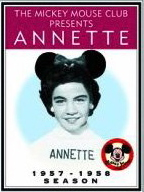
Annette is now a wildly surreal experience, a slow-motion soap opera where almost nothing happens but arrivals and departures. Characters mostly discuss what has already happened, or talk about what may soon happen. The mystery of how Annette McCloud's father became estranged from his family is dispensed with in a single, bizarre burst of exposition from Uncle Archie. The issue is then dropped as if it had never existed. Naturally, this is the Disney universe in which alcohol, drugs, vice and racial diversity are unknown. The kids go to school but nobody studies or takes a test. Food is given a big emphasis; one kid is a comedic chowhound. Uncle Archie is always ordering the maid to pour Annette a "tall glass of milk." The show stops to watch the maid slowly pour the entire glass, as if Disney had an outside arrangement with the Dairy Association. Annette's world is also sexless. Nobody would ever think of kissing; I'm not sure we even see kids holding hands. The Hayride of chapter 14 takes place in broad daylight as the kids sing a seemingly endless list of generic tunes, like "Row Row Row Your Boat." This may have been the inspiration for the migraine-inducing sing-along scene in Pee Wee's Greatest Adventure. Annette is a charming artifact from the 1950s that shows Disney fighting a one-empire battle against the forces of cultural progress. What people forget is that a sizeable portion of young people both then and now is raised with many of the values shown in the program. Annette is courteous and fair-minded, and simply wants to make herself a better person. It's almost a Utopian notion, from a TV decade that thrived on idealized social fantasies. Annette would make a good discussion piece for our current so-called Culture Wars. Conservatives might say that Disney's small-town paradise -- a complacent Shangri-La free of disturbing social issues -- is an ideal that needs to be rediscovered. 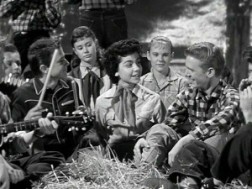
The Disney Treasures 2-disc presentation of The Mickey Mouse Club Presents Annette contains twenty perfectly preserved episodes complete with title sequences. Leonard Maltin introduces the show from the front of the Disney Animation building that served as the entrance to Annette's new high school. Disc one includes the entire Mickey Mouse Club show that introduced the Annette serial, and a featurette about Annette's singing career. As it turns out, friends Annette and Paul Anka each enjoyed hit songs inspired by the other; hers was called Tall Paul. The second disc includes the full Mickey Mouse Club show from the last day of the series, and a longer career tribute to Annette with input from friends, relatives and Disney associates. Ms. Funicello has been dealing with Multiple Sclerosis for many years now, a development that the featurette addresses respectfully. The DVD valentine ends on an affectionate, positive note. In the interesting "collectable poster" insert is an on-set portrait of Annette McCloud. Annette isn't even smiling, which makes her look even prettier.
|
|
The Chronological Donald vol 4: 1951 - 1961 presents the later career of Disney's most popular cartoon character. The white duck with the anger-management issues did battle with chipmunks, bears, irascible nephews and the seductive canard fatale who goes by the name Daisy. 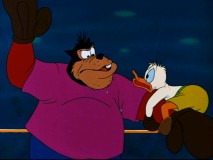
As his attention shifted to television and away from a theatrical environment that no longer needed short subjects, Disney adapted as best he could. The Disney story people strained to come up with clever situations to allow Donald to tangle with his adversaries Chip 'n Dale. One cartoon has fun with a large-scale model train, a hobby that interested Walt at this time. Another, Test Pilot Donald uses remote controlled model planes -- the chipmunk pilots have fun climbing into the miniature cockpit and causing havoc. The same happens with a toy boat in Chips Ahoy. The cartoons show Disney experimenting with new movie formats. The 3D cartoon Working for Peanuts is presented flat but accompanied by a commentary with Leonard Maltin and animation expert Jerry Beck. Disney tries out CinemaScope for its cartoons beginning with 1954's Grand Canyonscope. These may have been impressive on the big screen, but don't alter the entertainment formula all that much. The park ranger does tell his tourists, however, to "Spread out -- this is CinemaScope!" 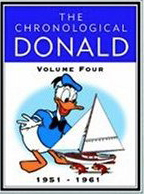
Some of the cartoons reflect the fifties' concern with modern issues. Donald is building a freeway that will destroy Chip 'n Dale's tree in Dragon Around. Litterbugs trash the wilderness in some hilarious cartoons about the bears that loiter in a national park, bumming free meals from tourists -- the possible inspiration for Yogi Bear? The Disney writers appear to crib the basic idea of Norman McLaren's experimental film Neighbors for a cartoon where Donald engages in a competition with a thoughtless neighbor. 1955's No Hunting, a violent farce about outdoorsmen going berserk in hunting season, is heavily reminiscent of Tex Avery's Field and Scream from the same year. Avery's effort is funnier but the Disney has a gag where Bambi and his mother detect the presence of man, by seeing all the garbage floating down a forest stream. Maltin comes on screen to provide sensitivity disclaimers for a pair of cartoons that exploit black stereotypes. A lazy, drawling ant character is based on Stepin Fetchit in Uncle Donald's Ants, and a second cartoon is built around a trio of "cannibal pygmies" escaped from the circus. Some of the less provocative cartoons now seem just as insensitive. (Spare the Rod) takes unfair swipes at the "fraud" perpetrated by child psychology, while Donald's Diary is a domestic nightmare. In it Donald daydreams that Daisy Duck is a greedy, two faced seducer, who will become an abusive harridan after the wedding ceremony. The cynical attitude of this cartoon makes us wonder if there were a bitter divorce or two in the animation department that year. 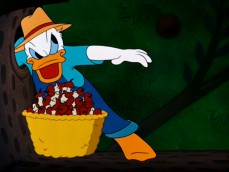
Donald Duck cartoons from later in the decade take on educational and even public service themes, as if partially funded from school and industrial sources. The well received Donald in Mathmagic Land uses clever animation to excite children about the relevance of and practical need for mathematics. Like Disney's earlier Disney in Space and Beyond, it's edu-tainment at its best. But we also get cartoons about safety at home and at work. While Donald suffers multiple injuries and maimings, a little creature called J.J. Fate resents taking all the blame for human stupidity. Bonus material includes an interesting featurette about the history of Donald Duck in the comics that includes a nice chapter on the wonderful Scrooge McDuck comic book adventures. As a special added bonus, Disc Two offers a number of relatively new Donald Duck cartoons from the Mouseworks TV show. Both Walt Disney Treasures offerings come in those odd tin boxes, and include mini-posters on card stock and collector's authenticity certificates. They're worthy additions to the Treasures series.
On a scale of Excellent, Good, Fair, and Poor,
Reviews on the Savant main site have additional credits information and are often updated and annotated with reader input and graphics.
Review Staff | About DVD Talk | Newsletter Subscribe | Join DVD Talk Forum |
| |||||||||||||||||||||